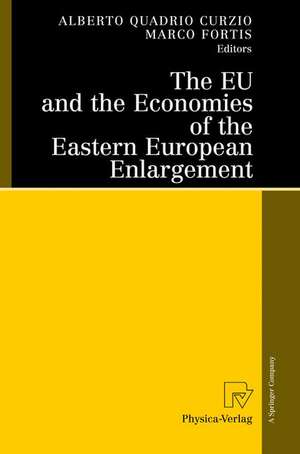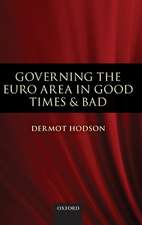The EU and the Economies of the Eastern European Enlargement
Editat de Alberto Quadrio Curzio, Marco Fortisen Limba Engleză Paperback – 3 iun 2008
Preț: 383.33 lei
Nou
Puncte Express: 575
Preț estimativ în valută:
73.35€ • 76.74$ • 60.93£
73.35€ • 76.74$ • 60.93£
Carte tipărită la comandă
Livrare economică 02-16 aprilie
Preluare comenzi: 021 569.72.76
Specificații
ISBN-13: 9783790820331
ISBN-10: 3790820334
Pagini: 212
Ilustrații: VI, 202 p. 79 illus.
Dimensiuni: 155 x 235 x 14 mm
Greutate: 0.3 kg
Ediția:2008
Editura: Physica-Verlag HD
Colecția Physica
Locul publicării:Heidelberg, Germany
ISBN-10: 3790820334
Pagini: 212
Ilustrații: VI, 202 p. 79 illus.
Dimensiuni: 155 x 235 x 14 mm
Greutate: 0.3 kg
Ediția:2008
Editura: Physica-Verlag HD
Colecția Physica
Locul publicării:Heidelberg, Germany
Public țintă
ResearchCuprins
Cooperation, Integration, and Enlargement of Europe.- The EU-27 Integration and Economic Relationships with the East: An Introductory Analysis.- The Economic Goals of the Enlargement and the Challenges to the 27 EU Countries.- “Great Europe”: A Pan-European Perspective on the Future of Europe.- Trade and Foreign Direct Investment: Italy, Germany, and the New Europe.- Integrating the Balkans with the European Union.- European Banking Institutions and Eastern Europe.- The European Central Bank, Italy, and the Integration of Eastern Europe.- The Role of the European Bank for Reconstruction and Development (EBRD) in the Transition of the Banking and Financial Systems.- Enterprises and Economy in the Transition Process.- The Importance of Entrepreneurship for Democratic Development in Central and Eastern Europe.- East–West European Integration: Patterns of Catching-Up and Labour Market Implications.- Trade and Foreign Direct Investments: The Point of View of Central Eastern European Countries.- The European Enterprise of General Interest: A Tool for Balanced Development.
Textul de pe ultima copertă
The enlargement of the European Union towards the East from May 2004 has generated an increase of about 100 million inhabitants in the EU population, and has especially brought along major challenges and important opportunities both for the "new" countries and for the "old" member states. That is the main focus of this volume, which is divided into three sections. The first analyses the effects of the enlargement on the functioning of Community institutions, on the relations with the other Eastern European countries, and finally on regional and global economic dynamics; the second section analyses in detail the role of the monetary politics of the European Central Bank and the activities of the European Bank for Reconstruction and Development; and the third deals with the importance of the entrepreneurial class in ensuring the success of the transition process of the Eastern European economies.
Caracteristici
Eastern European enlargement analysed from different points of view Written by academics and representatives from institutions in an accessible way, thus offering insights into the European economic and political evolution

















